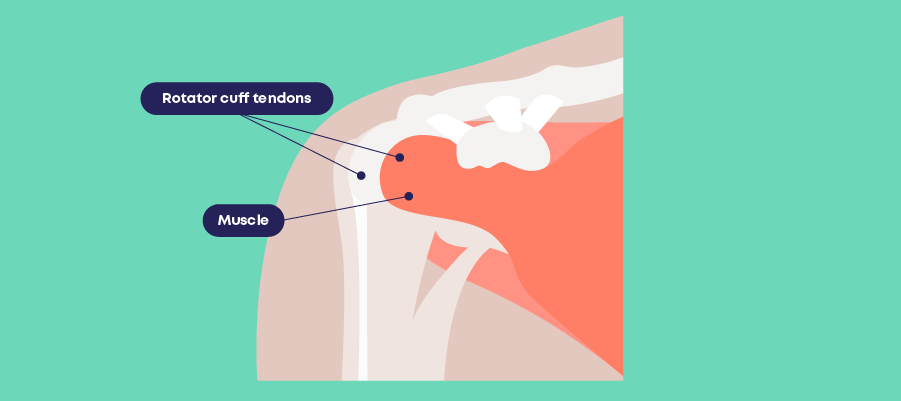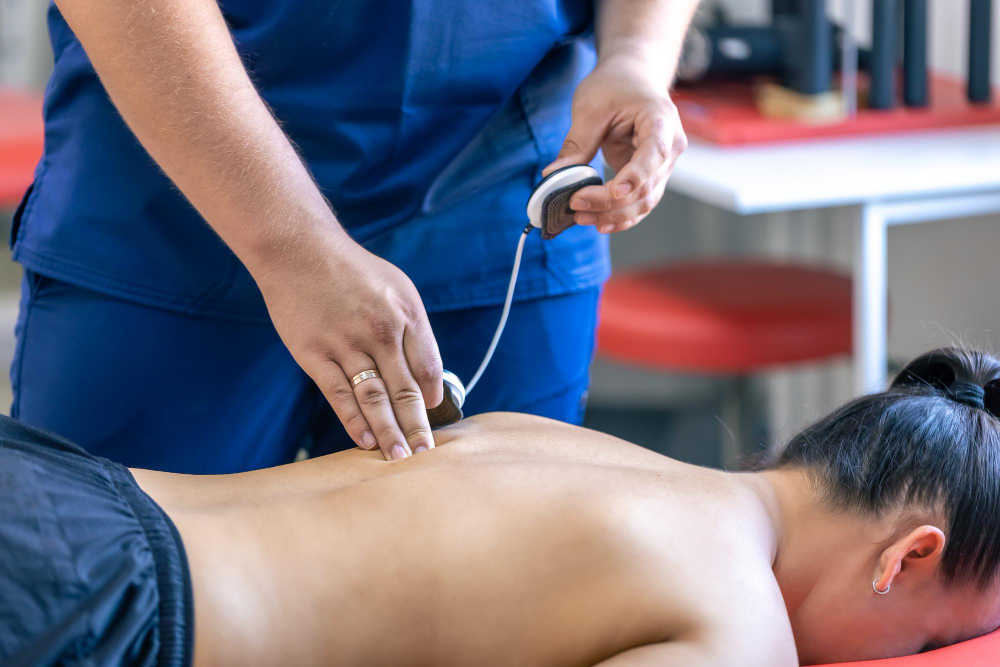Shoulder pain is one of the most common types of joint pain in the UK, with rotator cuff tendinitis one of the main culprits – also sometimes referred to as shoulder tendinitis or supraspinatus tendonitis.
But what is rotator cuff tendinitis? And what can you do about it? Let’s dive in!
What is rotator cuff tendinitis?
Your shoulder is made up of a number of joints, tendons and muscles that allows your arm to have a wide range of motion. Your arm is held in your shoulder socket by a group of muscles called the rotator cuff that covers the top of your upper arm and attaches to your shoulder blade. If you suffer from tendinitis then the tendons in your rotator cuff are inflamed, irritated or damaged.
Rotator cuff tendinitis is a condition that usually manifests itself over time as it gets increasingly irritated – for example sleeping on your shoulder every night or playing a sport that requires you to frequently lift your arm over your head.

Rotator cuff tendinitis symptoms
While rotator cuff tendinitis symptoms may start as mild and can be relieved with rest and home remedies, the symptoms often gradually worsen over time and can become persistent, causing problems in your day-to-day life.
Rotator cuff tendinitis symptoms can include:
- Pain and swelling at the top and outer side of your shoulder
- Pain that gets worse if you lift your arm up – especially over your head
- Aches and pains in your shoulder that stop you from sleeping
- Arm weakness
- A clicking sound when you raise your arm above your head
Rotator cuff tendinitis should not make your shoulder feel stiff. If this is one of your symptoms then you might be suffering from a frozen shoulder.
How is rotator cuff tendinitis diagnosed?
If you’re experiencing symptoms of rotator cuff tendinitis then the first thing to do is get it properly diagnosed – usually this is initially done by a GP (General Practitioner) however it is possible to go directly to an osteopath or physiotherapist.
- Your appointment will usually begin by your practitioner asking you about your symptoms, how long they have been going on for and whether there is anything that may have triggered the pain. They may also ask you some questions about your medical history and whether you have experienced any other shoulder pain in the past.
- Next, they will physically examine your shoulder. They will ask you to point out the area in which you are experiencing pain and will test your range of motion by asking you to move your arm in different directions and perform specific tests to check for rotator cuff tendinitis.
- To confirm a rotator cuff tendinitis diagnosis, your healthcare professional may order imaging tests. You may be sent for an X-ray to rule out any other causes of your symptoms such as a fracture, or you may be asked to attend an ultrasound or MRI scan to check for inflammation in your rotator cuff and any signs of a rotator cuff tear.
- If the assessment and imaging studies confirm a rotator cuff tendinitis diagnosis then you could initially try some osteopathic treatment, or visit a shoulder consultant, if the injury is severe.
Rotator cuff tendinitis treatment
The initial treatment of rotator cuff tendinitis involves managing the pain and swelling. This can be managed at home by:
- Avoiding any activities that cause pain in your shoulder.
- Using ice packs to reduce inflammation and pain. You can find out more about cold therapy here.
- Taking nonsteroidal anti-inflammatory drugs such as ibuprofen or paracetamol.
Other rotator cuff tendinitis treatment includes:
Physical therapy: This can help you by restoring normal function to the body using a specific techniques and a rehabilitation treatment programme.
Steroid Injection: If your pain isn’t being managed by home therapies or physical therapy then your GP may administer a steroid injection to reduce inflammation and pain.
Surgery: If non-surgical treatment doesn’t work then your GP may recommend that you have surgery to widen the space around the rotator cuff tendon. How long it takes for a rotator cuff to heal after surgery very much depends on the severity of your tear but can take several months in some cases.
How can Carl Todd Clinics help?
If you think you might be suffering from rotator cuff tendinitis, then there’s no need to suffer in silence. Please get in touch so we can help you on the road to recovery. Our team of friendly, experienced and qualified osteopaths can create a personalised treatment programme to help alleviate the pain and symptoms of rotator cuff tendinitis!





